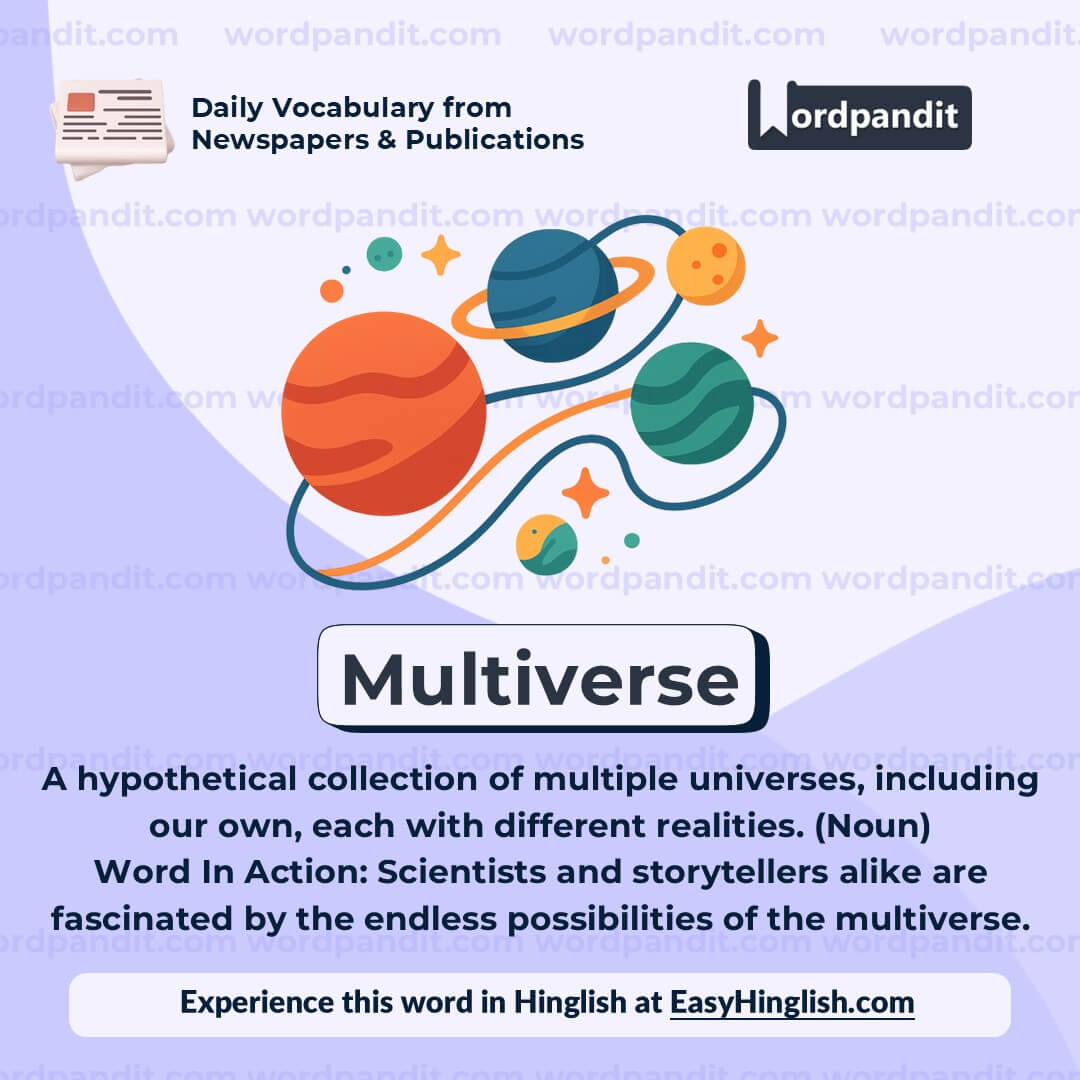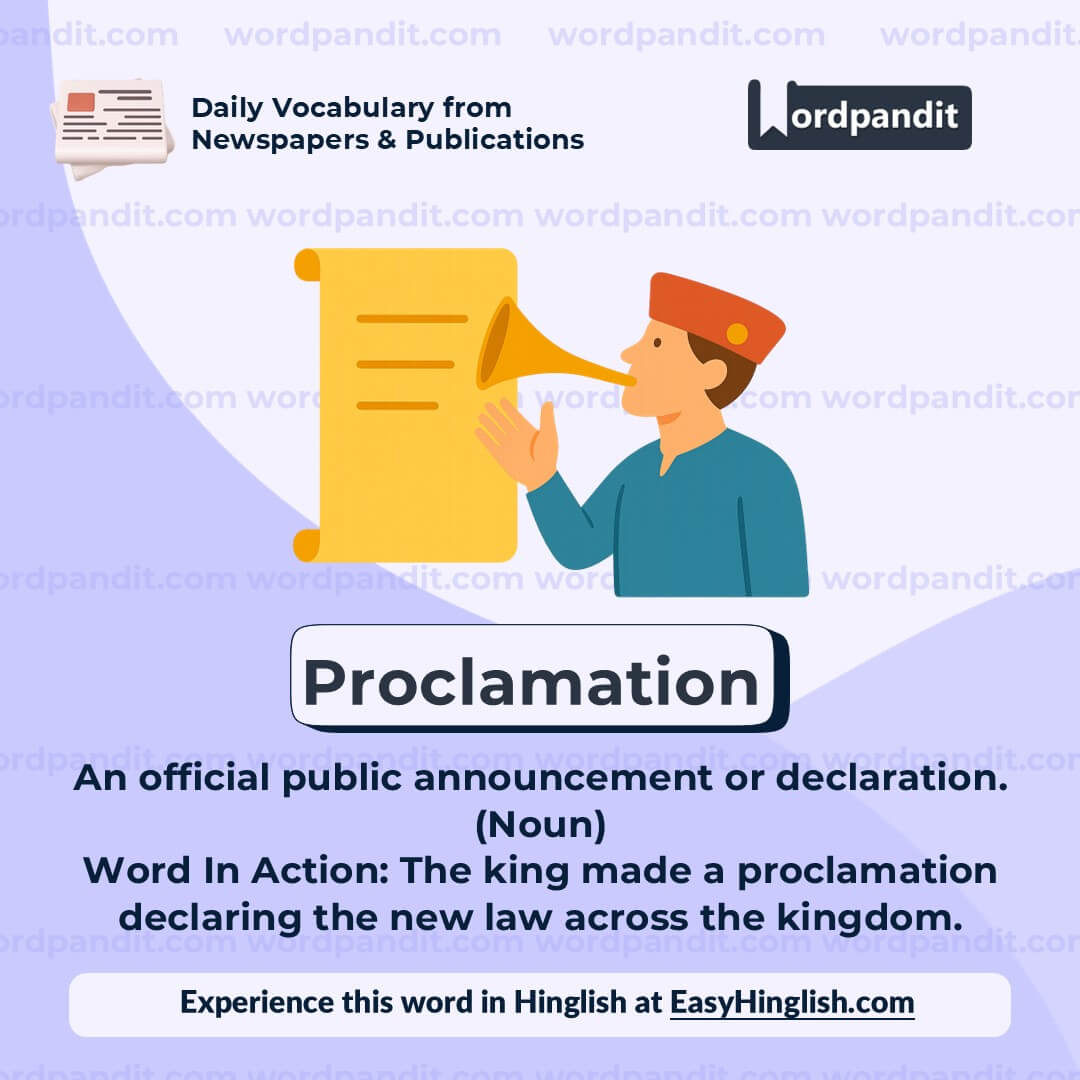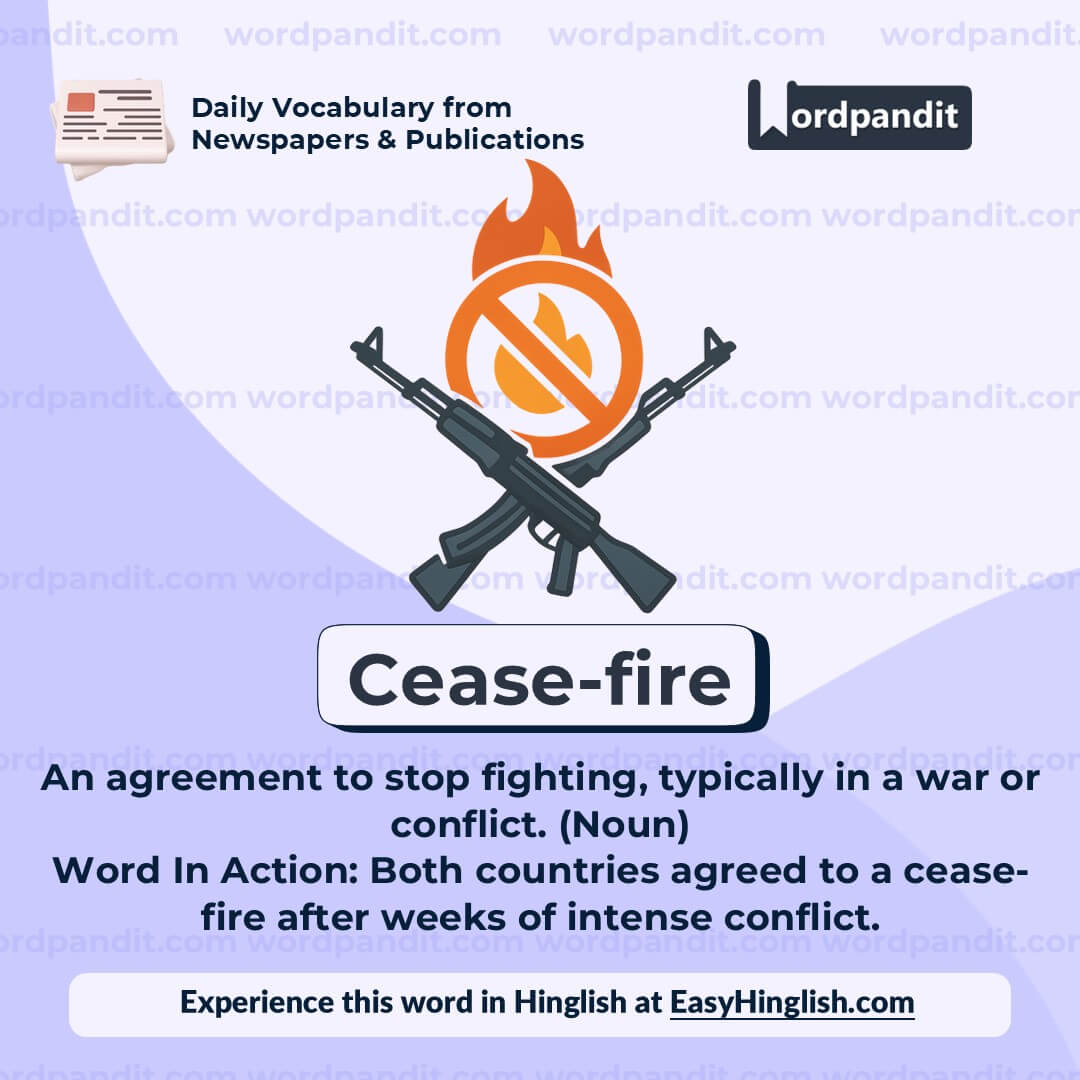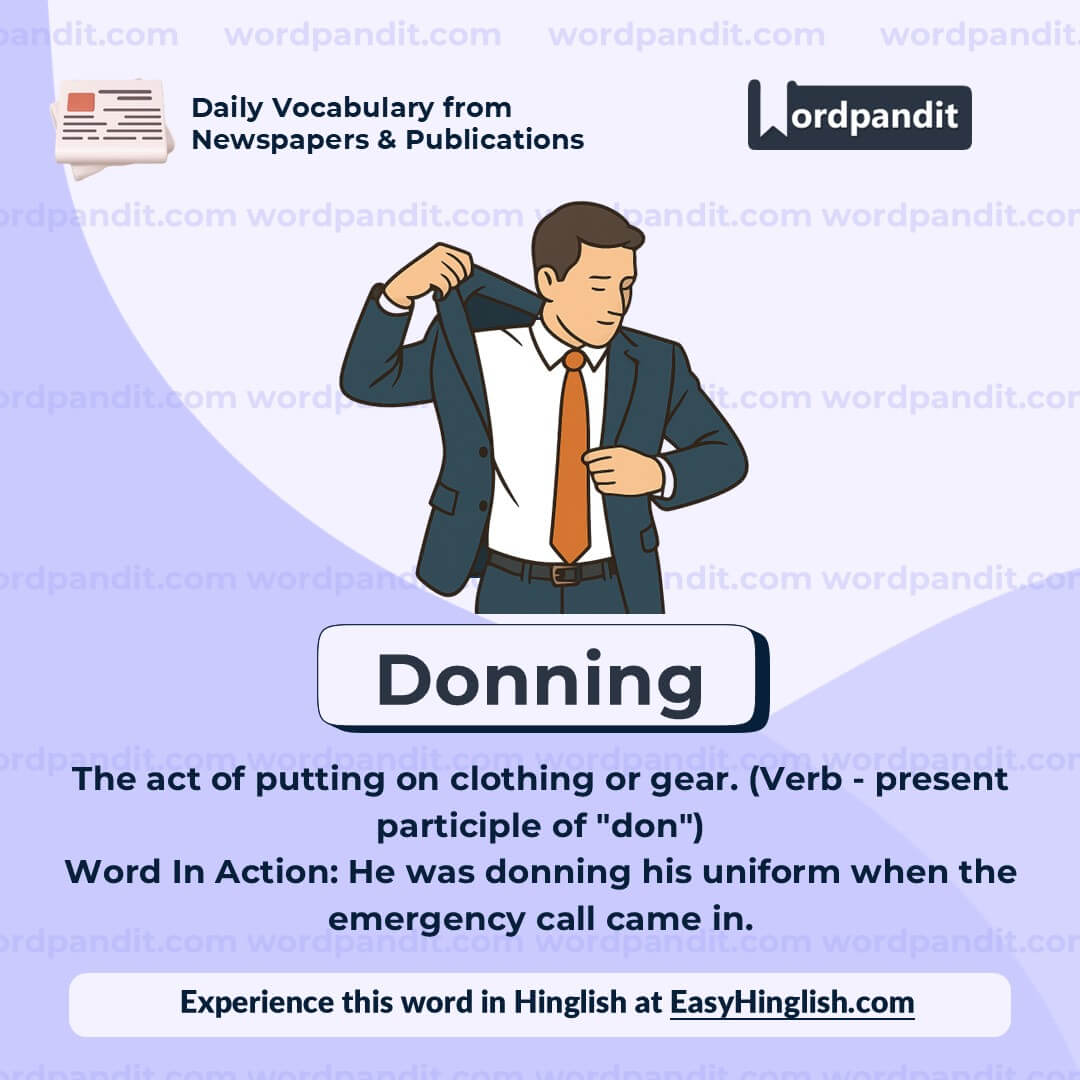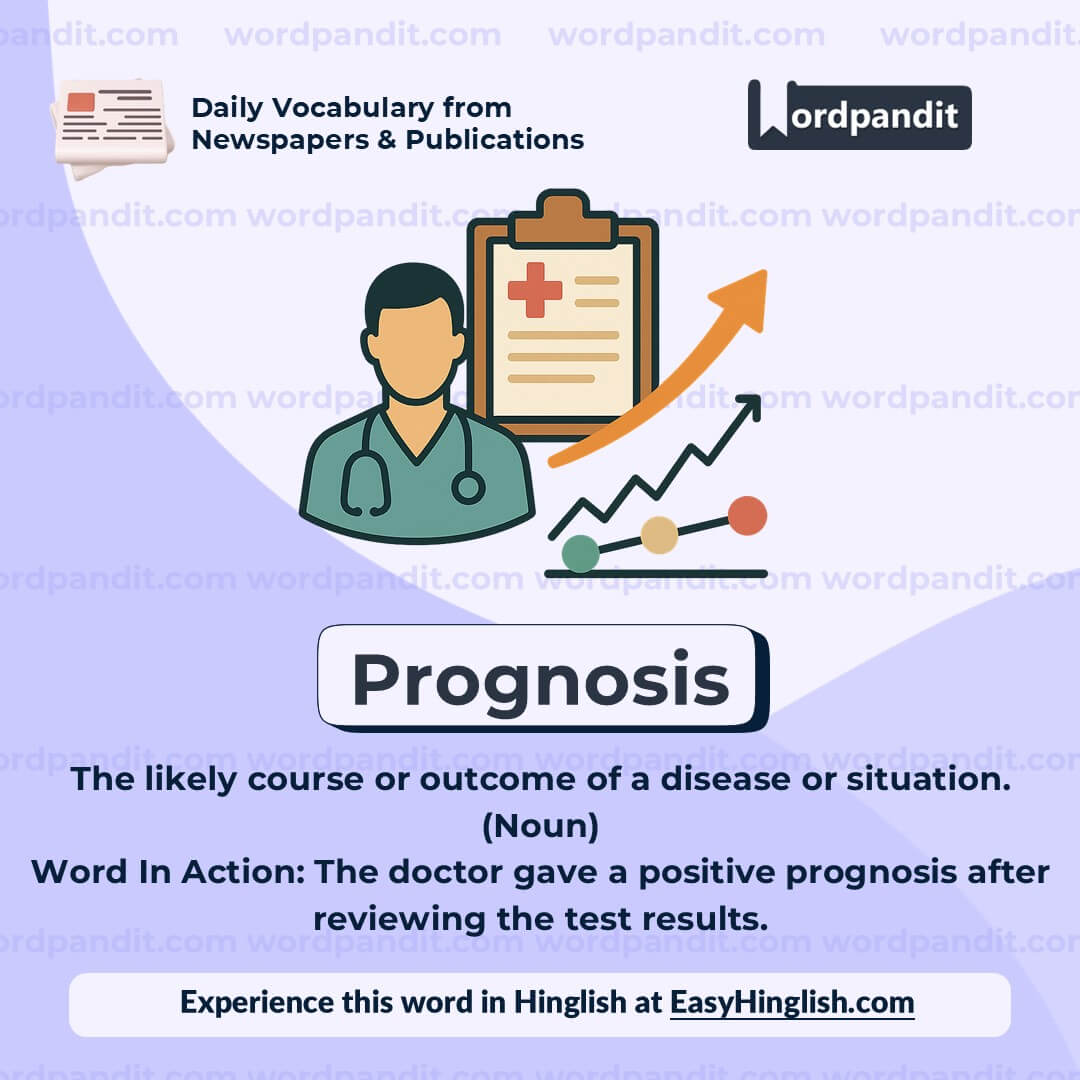Daily Vocabulary from International Newspapers and Publications
Expand Your Vocabulary with Wordpandit’s Global Vocabulary Hub
At Wordpandit, we are committed to helping you develop a truly global vocabulary by drawing from some of the most respected international publications. This section is designed to keep you ahead of the curve by introducing you to words that define global conversations and trends.
The Power of Global Sources
To help you think and communicate on a global scale, we curate vocabulary from renowned international sources, such as:
- The New York Times
- The Washington Post
- BBC
- The Guardian
- The Economist
- Scientific American
- Psychology Today
- And many more...
Stay Global, Stay Competitive
Our daily updates from international publications ensure you are consistently exposed to new words that reflect global news and developments, making sure your vocabulary is not only current but also globally relevant.
Enhance Your Global Perspective
Whether you’re preparing for international exams, aiming to excel in global business communication, or want to enhance your language skills for personal growth, Wordpandit offers the resources you need to thrive in a global context.
Effective Learning, Global Reach
Our learning methodology combines global examples, memory aids, and interactive activities, allowing you to internalize new words effectively and apply them in real-world scenarios.
Begin Your Global Vocabulary Journey Now!
Why Choose Wordpandit?
Practical Learning: Focus on words you'll actually encounter in real-world reading, enhancing your comprehension and communication skills.
Diverse Content: From current affairs to scientific breakthroughs, our varied sources expose you to vocabulary across multiple domains.
Effortless Integration: Make Wordpandit a part of your daily routine. Just a few minutes each day can significantly boost your lexicon over time.
Your Path to Vocabulary Mastery
- Visit our Daily Vocabulary section regularly
- Explore new words and their usage in context
- Practice incorporating these words into your own writing and speech
- Track your progress as your vocabulary expands
Start Your Journey Today
Embark on your vocabulary enhancement journey with Wordpandit. By consistently engaging with our daily posts, you'll build a robust vocabulary that serves you well in academic, professional, and personal contexts.
Remember, a word a day keeps linguistic limitations at bay. Make Wordpandit your daily companion in the quest for vocabulary excellence!
WORD-1: Multiverse
Context:
"Bring up the concept of the Multiverse, and you’re likely to get a variety of responses. Some will look to it as an idea full of hope: the hope that there’s a version of you out there that made a bolder choice, had a better outcome, or avoided a critical blunder at some point along your life path." - Big Think
Explanatory Paragraph:
The term "Multiverse" refers to the hypothetical existence of multiple, possibly infinite, universes that coexist with our own. Each of these universes may operate under different physical laws, timelines, or outcomes based on varying choices and events. While originally a theoretical concept in physics and cosmology, the idea has become popular in science fiction and pop culture, inspiring stories that explore alternate realities, versions of ourselves, and what might have been.
Meaning: A hypothetical collection of multiple universes, including the one we live in. (Noun)
Pronunciation: mul-tee-vurs
Difficulty Level: ⭐⭐⭐ Intermediate
Etymology: From Latin "multi" meaning "many" + "universe" meaning "all that exists"; first used in cosmological theories in the 20th century.
Prashant Sir's Notes:
Think of the Multiverse as a grand what-if scenario generator. Every decision leads to a different possible outcome, each creating a new universe. It's an imaginative way to reflect on choices, possibilities, and the unknown dimensions of existence.
Synonyms & Antonyms:
Synonyms: parallel universes, alternate realities, many-worlds, cosmos, dimensions
Antonyms: universe (as singular), single reality
Usage Examples:
- In the movie, the hero travels through the multiverse to find a version of herself who made different life choices.
- Some physicists propose the multiverse theory to explain quantum phenomena that cannot be understood by our universe alone.
- The idea of the multiverse makes us wonder: what if we had taken a different path?
- Science fiction novels often explore the multiverse to highlight how small decisions can create vastly different worlds.
Cultural Reference:
"Everything Everywhere All At Once" is an Oscar-winning film that creatively explores the concept of the multiverse by showing one woman's simultaneous existence across multiple realities. - A24 Films
Think About It:
If you could glimpse into a parallel universe, what version of yourself would you be most curious to meet, and why?
Quick Activity:
Write a short paragraph imagining a version of your life in a parallel universe where you made a completely different career or personal choice. What changes?
Memory Tip:
Remember: “Multi” = many, and “verse” = universe. Multiverse = many universes!
Real-World Application:
In physics, the multiverse is a theoretical framework discussed in quantum mechanics and cosmology. In pop culture, it’s widely used in movies, books, and video games to explore alternate timelines, identities, and outcomes.
WORD-2: Proclamation
Context:
"Given the head-spinning pace of President Trump’s proclamations and executive orders, it is not surprising that yesterday’s shock is continually being buried under today’s awe. Take Ukraine, for example. Even before coming back to the White House, Trump said he wanted a quick end to the war, starting with a 30-day cease-fire." - The New York Times
Explanatory Paragraph:
A proclamation is an official, formal public announcement made by a person in authority, often used to declare a new policy, law, or significant decision. It can be spoken or written and usually carries legal or political weight. In modern politics, leaders frequently use proclamations to quickly inform the public about executive decisions or positions on national and international matters.
Meaning: An official formal announcement or declaration made by a person in authority. (Noun)
Pronunciation: pro-kluh-MAY-shun
Difficulty Level: ⭐⭐ Basic
Etymology: From Latin "proclamatio", from "proclamare" meaning "to shout out"; influenced by Middle English and Old French.
Prashant Sir's Notes:
Think of a proclamation as a public megaphone — a way for a leader or authority figure to announce something important to everyone at once. These are not just statements, but official declarations with consequences or actions attached.
Synonyms & Antonyms:
Synonyms: declaration, announcement, decree, edict, pronouncement
Antonyms: silence, concealment, secret, suppression
Usage Examples:
- The president issued a proclamation declaring a national holiday.
- With great fanfare, the king’s proclamation was read aloud in the town square.
- Her proclamation of love surprised everyone at the wedding reception.
- Through a formal proclamation, the government enacted emergency laws.
Cultural Reference:
Abraham Lincoln’s *Emancipation Proclamation* (1863) was a historic presidential order that declared the freedom of all slaves in Confederate states during the American Civil War. - National Archives
Think About It:
Why do you think leaders choose proclamations over ordinary communication methods when making important announcements?
Quick Activity:
Write your own mini-proclamation (2-3 lines) declaring a personal law or belief you stand by. For example, "I hereby proclaim that weekends are sacred and should be free from all work emails."
Memory Tip:
“Proclamation” starts with “pro-” (forward) and “claim” (to say or declare). So it’s something you declare forward and publicly.
Real-World Application:
Proclamations are commonly used by political leaders, government officials, and monarchs to announce public holidays, policies, or emergency measures. They're also used in historical contexts to signal major legal or social changes.
WORD-3: Cease-fire
Context:
"Given the head-spinning pace of President Trump’s proclamations and executive orders, it is not surprising that yesterday’s shock is continually being buried under today’s awe. Take Ukraine, for example. Even before coming back to the White House, Trump said he wanted a quick end to the war, starting with a 30-day cease-fire." - The New York Times
Explanatory Paragraph:
A cease-fire is a temporary or permanent agreement between warring parties to stop fighting. It’s often seen as a critical first step toward peace negotiations or a humanitarian pause to allow aid, rescue, or diplomacy. While not necessarily the end of a conflict, a cease-fire creates space for dialogue and can be either mutually agreed upon or declared unilaterally.
Meaning: An agreement between opposing sides in a conflict to stop fighting for a period of time. (Noun)
Pronunciation: sees-fy-er
Difficulty Level: ⭐⭐ Basic
Etymology: From “cease” meaning to stop, and “fire” referring to weapons or combat; first used in military contexts in the early 20th century.
Prashant Sir's Notes:
Think of a cease-fire as a "pause button" in a war — it doesn’t mean peace has been achieved, but it’s a crucial opening to make peace possible. It's also used metaphorically in everyday language to describe pauses in any kind of conflict.
Synonyms & Antonyms:
Synonyms: truce, armistice, suspension of hostilities, break in fighting, peace pause
Antonyms: combat, warfare, conflict, hostilities, fighting
Usage Examples:
- The two countries agreed to a 48-hour cease-fire to allow civilians to evacuate the conflict zone.
- Negotiators pushed for a cease-fire as a starting point for broader peace talks.
- A sudden cease-fire brought a moment of hope to the war-weary region.
- The cease-fire was broken within hours, as both sides blamed each other for violations.
Cultural Reference:
During World War I, the famous "Christmas Truce" of 1914 was an informal cease-fire where soldiers from opposing sides stopped fighting, exchanged greetings, and even played football in no man's land. - Imperial War Museums
Think About It:
Can a temporary cease-fire help build long-term trust between enemies, or does it only delay inevitable conflict?
Quick Activity:
Use the word “cease-fire” metaphorically in a sentence describing a personal or social conflict (e.g., a family argument, political debate, etc.).
Memory Tip:
“Cease” means stop, and “fire” refers to shooting — so a cease-fire is when the shooting stops. Easy visual!
Real-World Application:
Cease-fires are crucial tools in international diplomacy and humanitarian efforts. They provide a chance to negotiate peace, deliver aid, and prevent further loss of life. The term is also used metaphorically to describe the de-escalation of tensions in politics, relationships, and business conflicts.
WORD-4: Donning
Context:
"Trump did offer one last comment on the tariffs before donning his big-boy golf pants. 'The operation is over,' he said. 'The patient lived, and is healing. The prognosis is that the patient will be far stronger, bigger, better and more resilient than ever before.'" - The Guardian
Explanatory Paragraph:
"Donning" means putting on clothes or accessories, especially in a somewhat formal or deliberate manner. It is a more expressive way of saying “wearing” or “putting on,” often used to add a touch of style, formality, or irony. In both everyday and literary usage, it brings visual attention to the action of dressing, especially when it involves a particular item of clothing that symbolizes a role or attitude.
Meaning: The act of putting on clothing or accessories. (Verb – present participle of “don”)
Pronunciation: DON-ing
Difficulty Level: ⭐⭐ Basic
Etymology: From Middle English “donnen,” a contraction of “do on,” meaning to put on (clothes); first recorded in the 14th century.
Prashant Sir's Notes:
“Donning” is like the stylish cousin of “putting on.” You don't just throw on a jacket—you *don* it, especially when the act is intentional, symbolic, or even humorous. Use it when you want to emphasize the moment of transformation or preparation.
Synonyms & Antonyms:
Synonyms: putting on, dressing in, slipping into, getting into, outfitting
Antonyms: removing, taking off, doffing, undressing, shedding
Usage Examples:
- She was donning a red gown that shimmered under the ballroom lights.
- Before stepping onto the field, the players were seen donning their team jerseys.
- He smiled proudly while donning his graduation cap and gown.
- The actor, donning a long black cloak, transformed completely into the villain on stage.
Cultural Reference:
In superhero lore, Bruce Wayne donning the Batman suit is not just a change of clothes—it’s a transformation into another identity. The act of donning the suit symbolizes readiness, purpose, and power. - DC Comics
Think About It:
What does the way we “don” certain clothing say about our intentions, roles, or mindset in that moment?
Quick Activity:
Describe a moment from your life when you were donning something meaningful (a uniform, costume, or outfit) and explain how it made you feel.
Memory Tip:
“Donning” = “Do on” — just reverse it and you’ll remember it means to *put on* clothes.
Real-World Application:
“Donning” is often used in media, literature, and formal writing to add emphasis or elegance to an action. It’s also used in medical and safety contexts (e.g., donning protective gear), making it both poetic and practical in real-world use.
WORD-5: Prognosis
Context:
"Trump did offer one last comment on the tariffs before donning his big-boy golf pants. “The operation is over,” he said. “The patient lived, and is healing. The prognosis is that the patient will be far stronger, bigger, better and more resilient than ever before.”" - The Guardian
Explanatory Paragraph:
The word prognosis refers to a forecast or prediction, often about how a situation will develop. Originally used in the context of medicine to predict the likely outcome of an illness, it has now been extended to other areas like economics, politics, and general planning. In this context, Trump uses “prognosis” metaphorically to describe a positive outlook on the economic situation following tariffs, suggesting recovery and growth.
Meaning: A forecast or prediction about the likely outcome of a situation, especially a medical condition (noun)
Pronunciation: prog-NO-sis
Difficulty Level: ⭐⭐⭐ Intermediate
Etymology: From Greek "prognōsis", meaning "foreknowledge", from "pro-" (before) + "gnōsis" (knowledge)
Prashant Sir's Notes:
Think of "prognosis" as a professional or expert prediction—it's not just a guess. Whether it's a doctor predicting recovery or an analyst predicting the market, prognosis involves informed foresight. Don't confuse it with "diagnosis" which is about identifying a problem; "prognosis" is about what will happen next.
Synonyms & Antonyms:
Synonyms: prediction, forecast, outlook, expectation, projection
Antonyms: hindsight, uncertainty, guess, speculation
Usage Examples:
- The doctor's prognosis gave the family hope that she would make a full recovery.
- Despite early setbacks, the economic prognosis for the year remains optimistic.
- Analysts issued a bleak prognosis for the tech industry amid global uncertainty.
- His prognosis was more than medical—it was a message of hope for the entire team.
Cultural Reference:
"Prognosis: Negative" was the fictional name of a movie mentioned in the TV show *Seinfeld*, humorously used to avoid going on a date. It played on the clinical tone of the word, showing how it can also evoke a sense of dread or inevitability. - *Seinfeld* (NBC)
Think About It:
How does the use of medical metaphors like “prognosis” influence the way we talk about politics or the economy?
Quick Activity:
Write your own prognosis for a fictional situation—like the future of space travel or AI in education. Try to use both optimistic and cautious language.
Memory Tip:
Think of “pro” as “forward” and “gnosis” as “knowledge” — so prognosis is knowledge *before* it happens: a prediction.
Real-World Application:
Prognosis is widely used in healthcare to inform patients and families of likely outcomes. It’s also critical in fields like finance, environmental science, and politics where expert predictions guide decisions and policy-making.



